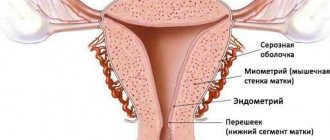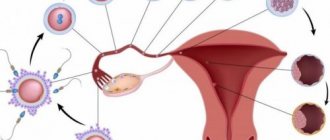Is it possible to determine pregnancy before a missed period?
From the first days of pregnancy, colossal changes occur in the body, which can be felt by a woman. They usually manifest themselves in the form of certain signs, the presence of which may indicate a short-term pregnancy.
Conception is possible subject to ovulation, during which a mature egg is released for fertilization by a male sperm. The fusion of female and male reproductive cells occurs in the area of the fallopian tube through the introduction of sperm into the egg.
The fertilized egg moves towards the uterine cavity, continuously dividing. At the time of implantation into the endometrium, it is a fertilized egg, which includes hundreds of cells.
Implantation often occurs on the 6th day after fertilization, and pregnancy occurs. There is an increase in the level of progesterone, the pregnancy hormone, which provokes the earliest signs before a missed period. They indicate successful conception.
Important! Hormonal changes affect the functioning of the entire body.
Progesterone is produced by the hormonal gland – the corpus luteum. If progesterone production is disrupted, there is a threat to prolongation of pregnancy, including until menstruation is missed. This is why it may be necessary to identify early signs of pregnancy before your period is missed.
Attention! Laboratory and instrumental research methods help diagnose pregnancy before a missed period.
When does conception occur?
Conception can only occur in the middle of a woman's cycle, which usually lasts from 25 to 35 days. If you had unprotected intercourse during this time, then there is a high probability that conception will occur. The introduction of a fertilized egg into the wall of the uterus usually occurs on the 5th or 6th day after conception , and only from this moment can the first signs of pregnancy occur.
This means that any signs immediately after sexual intercourse or for several days after it are physiologically excluded. At this moment, contact between the mother’s body and the fertilized egg simply does not exist.
The very first signs of pregnancy before a missed period
Symptoms of pregnancy in the early stages before menstruation are subjective. Their severity varies and does not depend on the number of previous pregnancies.
The first symptoms of pregnancy before a missed period include:
- Sensitivity and swelling of the mammary glands. This is one of the earliest signs, manifested in pain that occurs in the chest. Pigmentation of the nipples may occur.
- Minor bleeding. When the fertilized egg is implanted into the internal cavity of the uterus, vascular damage is observed, which is manifested by small amounts of bloody discharge.
- Reduced pressure. This is due to changes in hormonal levels and is expressed in drowsiness and weakness.
- Temperature rises to 37.5 °C. Increased production of progesterone causes low-grade fever.
- ARVI. The growing organism is a foreign body for the mother. To prevent rejection of the fertilized egg by the immune system, a physiological decrease in protective forces is observed. The mother's body becomes defenseless against numerous viruses and bacteria. In case of acute respiratory viral infection, you should take into account possible conception and take medications approved during pregnancy.
- Frequent urination. The symptom before the delay is due to the acceleration of blood circulation in the pelvis and changes in hormonal levels. If you experience pain during urination, you should visit a doctor and rule out an inflammatory process.
- Tingling in the uterine area. This is due to the growth of the uterus and the functioning of the corpus luteum.
- Diarrhea and flatulence. The symptom before the delay is caused by an increased level of progesterone, which relaxes the muscles of the organs located in the pelvis.
Changes in taste preferences, increased sense of smell, and changes in psycho-emotional nature are also considered early signs of pregnancy before menstruation.
What is important to know about PMS?
Premenstrual syndrome (PMS) is what doctors call a set of extreme manifestations on the eve of the next period.
This symptomatology manifests itself not only at the physiological level, but also in the psychological aspect. PMS-like sensations also occur in the early stages of pregnancy. Most women do not agree that there is anything wrong with them. Some ladies treat their mood swings with humor, claiming that it’s just “hormones jumping.” But many people are skeptical about PMS, considering it a “fictitious” diagnosis, without clear symptoms, citing some ailments. On forums they often write something like “PMS during pregnancy is nonsense!”
There is nothing special about this condition, but when women communicate, they often exchange knowledge about the symptoms of specific conditions. Having heard enough of such “diagnoses” or read about them on forums, ladies often expect such manifestations in their bodies, although in reality there are no prerequisites for this.
However, PMS is not a myth, and extreme manifestations lead them to rash actions and decisions made in anger that they would never make in a good mood. A similar PMS condition also occurs at the beginning of pregnancy, which men often discuss with humor.
Important: It is worth noting that sudden changes in structure and ailments occur at approximately the same time - on the eve of menstruation or during late pregnancy. Often women with long cycles - more than 30 days - suffer from PMS, as well as those with an unstable cycle.
If you are more attentive and listen to your body, it is easier to understand what is happening inside - the birth of a new life in the womb or just a hormonal surge. How to distinguish pregnancy from PMS? To do this, you need to compare both states.
How to determine pregnancy before missed period
Often, women mistake PMS symptoms before a missed period for signs of pregnancy. Determining pregnancy before a missed period is possible using a rapid test, hCG analysis, and ultrasound diagnostics. Monitoring basal temperature indicators is also essential. Some women prefer to use traditional methods of determining pregnancy before a missed period.
Pregnancy test
The rapid test reacts to the level of hCG in urine due to the presence of a special reagent. The concentration of the hormone begins to increase after implantation. HCG is produced to somehow block the maturation of eggs in the ovaries. Thus, successful conception can be determined approximately a week before the expected delay of menstruation.
Attention! An accurate result can be expected when performing the test, starting from the first day of a missed period.
When performing a rapid test before a missed period, you need to pay attention to its sensitivity. The level of hCG in urine is half that in the blood. That is why you should focus on the most sensitive test. If the test result is negative before the delay, the test can be repeated after a few days.
To get a reliable result, you must adhere to the testing rules set out in the instructions. HCG levels are determined in the morning, when its concentration reaches its maximum.
Important! Before using the test strip, pay attention to the expiration date. A positive result in the absence of pregnancy is rare and may indicate the presence of hormone-producing tumors.
HCG analysis
Determining the pregnancy hormone is a complex test. This is due to the fact that various factors can affect the reliability of the result. Before carrying out the analysis, preliminary preparation is required:
- the last meal should be at least 6 hours before testing;
- carrying out diagnostics in the morning;
- exclusion of nervous and physical overload, drinking alcohol, smoking.
To evaluate the result, venous blood (plasma) is required. The analysis is effective starting from the 6th day of successful conception. The level of the hormone depends on the stage of pregnancy. Usually, 5 mU/ml is taken as the minimum figure in the absence of pathologies from the internal organs. In the absence of pregnancy, this indicator requires examination.
Ultrasound
Ultrasound diagnostics is considered the most reliable method for determining successful conception. However, confirming pregnancy before a delay (uterine or ectopic) is not considered possible even with the help of high-quality equipment. This is due to the small size of the fertilized egg.
Typically, to visualize the ovum, a hCG concentration in the blood of 1000 mU/ml is required. An experienced specialist can confirm pregnancy no earlier than on the 5th day of a missed period. That is why, before the delay, it is advisable to perform a blood test for hCG to establish the fact of a progressing pregnancy.
Attention! When performing an ultrasound before a missed period, the doctor can assume conception based on indirect signs, such as the presence of the corpus luteum and blood flow characteristics.
Basal temperature
The method involves measuring the temperature in the rectum, vagina or mouth to determine fertile days and pregnancy. Constant observation allows you to suspect hormonal imbalance and inflammatory process.
The essence of the technique is to measure basal temperature daily at the same time in the morning. In order for the results to be accurate, the following rules must also be taken into account:
- nightly continuous sleep should be at least 6 hours;
- avoidance of alcohol and vigorous physical activity on the eve of measurements;
- determining temperature with a mercury thermometer.
Attention! Temperature can only be measured in one location. In ARVI, indicators are usually uninformative.
Based on the data obtained, a graph is created that can be built using special programs online. In the first phase of the cycle, basal temperature normally does not exceed 37 °C. 2 days before the release of the egg, implantation retraction is observed, which is manifested by a decrease in temperature with a sharp jump after ovulation. In this case, the temperature difference between phases 1 and 2 must be at least 0.4 °C.
Thus, the absence of implantation retraction followed by an increase in temperature indicates anovulation. A high temperature in the first phase may indicate a hormonal imbalance or an inflammatory process.
Normally, in the second phase of the cycle, the basal temperature is 37-37.5 ° C, which is associated with high levels of progesterone. Before the next menstruation, the temperature drops. The absence of a decrease in temperature before the delay may indicate successful conception.
How to determine pregnancy before menstruation using traditional methods
One of the popular ways to determine conception before a delay is diagnosis using soda. This method has a scientific basis.
Pour soda (1 teaspoon) into a container containing morning urine. The absence of hissing indicates pregnancy.
Reference! The acidic environment of the urine of non-pregnant women when in contact with soda causes the formation of bubbles. After conception, the environment becomes alkaline, which leads to the formation of sediment.
Successful conception can be recognized by the nature of the discharge. High levels of progesterone provoke increased mucous discharge, reminiscent of the ovulatory period. Hormonal changes also often cause the appearance of thrush due to the activation of opportunistic flora and a physiological decrease in immunity.
For some women, iodine, a drop of which should be applied to urine-soaked paper, helps determine pregnancy before a missed period. When stained purple, one can conclude that conception is successful.
Useful tips
If a woman doubts whether she is pregnant or not, but there is no way to make an accurate diagnosis, she must follow the following recommendations:
- Avoid stressful situations.
- Don't overexert yourself at work.
- Get enough time to sleep.
- Stop leading a sedentary lifestyle. You don't have to join a gym, just take more walks. You can swim, ride a bike.
If possible, adhere to proper nutrition and avoid drinking alcohol.
Can toxicosis begin before a missed period?
Toxicosis is manifested by nausea, dizziness and vomiting, motion sickness in transport, and increased salivation. Signs are typical for the 1st trimester of pregnancy. In some cases, these signs of toxicosis appear before the delay, approximately a week after successful conception.
There is a relationship between the severity of signs of toxicosis and the period of their occurrence. It is believed that the earlier the symptoms of toxicosis appear, the more severe its progression. There are 3 degrees of toxicosis:
- Mild, manifested in the form of 5 or less urges to vomit per day.
- Moderate severity, including up to 10 gags.
- Severe, implying constant vomiting with dehydration, decreased blood pressure, and increased heart rate.
Attention! In case of severe toxicosis, hospitalization is necessary.
Excessive salivation as a sign of toxicosis often appears before the delay and may be accompanied by nausea or vomiting. Severe salivation also requires treatment due to the loss of mineral salts.
The causes of toxicosis are not fully understood. There is an opinion that this sign indicates a successful prolongation of pregnancy.
Mood changes and drowsiness
The woman herself does not understand why her mood often changes, increased sensitivity and tearfulness appear. I want to either embrace the whole world, or close myself in my corner and not see anyone. This is how the hormonal background manifests itself, which begins to change in connection with pregnancy.
A pregnant woman constantly wants to sleep. Even after sleeping well at night, during the day he still looks for opportunities to take a little nap.
Signs of pregnancy before the delay by day of the cycle
The appearance of symptoms depends on the period of ovulation. In most women, the release of the egg from the follicle occurs on days 13-15 of the menstrual cycle.
What happens during pregnancy on day 17 of the cycle
Implantation on the 17th day of the menstrual cycle is possible subject to early ovulation. In a significant number of cases, during this period, movement of the fertilized egg through the tube is noted.
Signs of pregnancy on day 18 of the cycle
The implantation of the fertilized egg is observed when the egg is fertilized on approximately the 12th day of a 26-day menstrual cycle. There is an increase in hCG in the blood. However, it is still not possible to confirm conception in a laboratory way. There are usually no signs of pregnancy at this stage.
Signs of pregnancy on day 19 of the cycle
During this period, conception is possible if the cycle lasts an average of 27 days. In some cases, implantation takes a longer period of time. This is due to the migration of the fertilized egg inside the uterine cavity, which is usually attached along the posterior wall. It is this zone that is actively supplied with blood vessels and can provide the growing body with the necessary substances. Implantation may be accompanied by minor bloody discharge due to disruption of the integrity of small vessels.
Signs of pregnancy on day 20 of the cycle
According to statistics, the average cycle length is 28 days with ovulation on the 14th day. This means that most women undergo implantation during this period. The corpus luteum actively produces progesterone to prolong pregnancy. Women may experience increased urination, irritability, increased appetite, tingling in the right or left side (depending on the location of the corpus luteum that forms at the site of the burst follicle).
Signs of pregnancy on day 21 of the cycle
The cervix thickens and softens under the influence of progesterone. To protect the growing embryo from infection, the cervical lumen is closed with a mucus plug, which has bactericidal properties.
Signs of pregnancy on day 22 of the cycle
There may be a physiological decrease in immunity, which causes the female body to be susceptible to infections. Some women experience general malaise, sore throat, and runny nose.
Signs of pregnancy on day 23 of the cycle
Early signs of pregnancy often coincide with symptoms of PMS. Women may notice nagging pain in the lower back, tearfulness, and bowel movements.
Signs of pregnancy on day 24 of the cycle
Changes in hormonal levels provoke fatigue and dizziness. Some women note a lack of fresh air.
Signs of pregnancy on day 25 of the cycle
When measuring basal temperature, the indicators are in the range of 37-37.5 °C. An increase in general body temperature to subfebrile levels is also observed.
Signs of pregnancy on day 26 of the cycle
If you ovulate early, a highly sensitive pregnancy test may show a faint second line.
Signs of pregnancy on day 27 of the cycle
Another monthly cycle is coming to an end. With its average duration, pregnancy can be confirmed by performing a blood test for hCG.
Signs of pregnancy on day 28 of the cycle
Basal temperature exceeds 37 °C. Women may experience increased salivation and sensitivity to odors.
Signs of pregnancy on day 29 of the cycle
As a rule, during this period, women feel the approach of their critical days: slight spotting and pain in the lower abdomen appear. When measuring BBT, a decrease is observed, which indicates an early period. By the absence of these signs at the end of the cycle, pregnancy can be suspected before a missed period.
Signs of pregnancy on day 30 of the cycle
Some women experience nagging pain in the lower abdomen, which is sometimes mistaken for the onset of menstruation. The breasts are painful and enlarged.
Signs of pregnancy on day 31 of the cycle
Some representatives acutely feel the signs of toxicosis. Most women with an average cycle length experience a delay in menstruation, which is the most significant sign of successful conception.
Signs of pregnancy after missed period
There may be no signs of pregnancy in the first days of a missed period. Approximately 60% of women experience symptoms of toxicosis during the first trimester:
- increased salivation;
- sensitivity and intolerance to odors;
- taste perversions and changes in food preferences;
- nausea (mainly in the morning);
- vomit;
- motion sickness in transport.
Signs of successful conception after a missed period include:
- dizziness and headaches associated with changes in pressure due to increasing load on the circulatory system;
- frequent urination;
- bowel dysfunction;
- tingling in the uterus and side of the abdomen;
- nagging pain in the lower back and lower abdomen;
- feeling of thirst;
- increased appetite;
- vaginal thrush due to hormonal changes;
- engorgement and soreness, enlargement of the mammary glands;
- fatigue and drowsiness;
- mood lability.
The following signs indicate an unfavorable course of pregnancy, its ectopic nature or the threat of termination:
- severe cramping pain in the lower abdomen;
- pain in the rectum;
- bloody discharge (scarlet).
Attention! If such signs occur, you should immediately consult a doctor.
PMS or pregnancy: what are the causes of hormonal imbalance
Premenstrual imbalance in the body is cyclical in nature, which is why it is also called cyclic tension syndrome.
Sometimes people deliberately speculate on this condition or justify their inappropriate antics, but this condition manifests itself in less than 50% of women in the fertile phase, according to statistics. And if there are no symptoms of PMS, can there be pregnancy? It is quite possible that in both cases the condition is influenced by a hormonal “conflict” within the female body. In the West, PMS is taken into account in judicial practice, since most car accidents, attempted murders of their offenders and suicide attempts are committed in a state of depression, aggravated by premenstrual hormonal imbalance or PMS during pregnancy.
Prudent husbands know about the “difficulties” their wives have with PMS before pregnancy, during pregnancy or during cyclic pain. But they don’t really pay attention to the antics of their “halves,” and even sometimes indulge them. But female students have the lowest grades during such periods, especially when their stomach starts to hurt, but no one takes this feature into account.
Are the symptoms of PMS and pregnancy similar? Yes, there are a lot of similarities, so it’s easy to confuse the body’s manifestations during a hormonal imbalance between estrogen and progesterone. During pregnancy, this “conflict” is also mixed with the “pregnancy hormone” or hCG. If the day before you were treating infertility with hormonal drugs or complex products based on hormone-like compounds of plant origin (for ovarian dysfunction), you end up with an “explosive cocktail”.
This syndrome may be accompanied by complications after treatment of gynecological and sexually transmitted diseases. This can occur due to long-term treatment with antibiotics (affecting a shift in the acid-base balance) or an unsuccessful choice of oral contraceptives (cyclic tablets). All this creates additional stress on the female body.
Therefore, it is important for girls who have entered the phase of sexual activity to learn to monitor the manifestations of their body. It is recommended to mark the days of your period in a personal calendar to calculate the time of ovulation (in the middle of the cycle) and expected menstruation. Then it will be easier to understand whether these were symptoms of PMS or pregnancy - learn to listen to your body.
The described factors further undermine unstable hormonal levels, causing an imbalance in the endocrine system, which manifests itself in the form of PMS. In case of extreme manifestations that cause concern for one’s health and adequate behavior, it is necessary to consult a doctor, especially if there is a suspicion of conception.
In case of an aggravated form of PMS, doctors make a conclusion about the presence of PMDD (premenstrual dysphoric disorder) and prescribe corrective therapy. Such people should not work in responsible work that involves risk to their lives.
Are the symptoms of PMS and pregnancy similar? Yes, sure. And the hormonal system is considered a very complex structure of the female body; it is very easy to disrupt its full and stable functionality.
Reviews about signs of pregnancy before missed period
Reviews from women contain information about various signs of pregnancy that are observed a week before menstruation and after a delay.
Valeria Sergeevna Korobeynikova, 21 years old, Elista
The first signs of pregnancy appeared two days before my missed period. Usually, on the eve of menstruation, slight spotting appears. But in that cycle there were none. I bought a test, which showed a weak second line.
Alexandra Kirillovna Simakova, 24 years old, Timashevsk
About a week before my period, I was craving meat, which I am usually indifferent to. I ate it in large quantities the whole time. By the way, the born son also really loves meat.
Anastasia Vyacheslavovna Kamelina, 27 years old, Chistopol
In the first trimester, immediately after the delay, there was a threat of interruption. I was very worried, but the ongoing and worsening toxicosis in the form of constant nausea told me that the baby was developing. Then other signs appeared: appetite increased, taste preferences changed, and drowsiness occurred.










